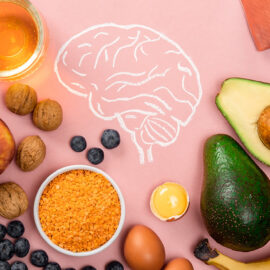The holiday season, while full of fun and good cheer, can also serve up a bellyful of stress for those who struggle with Irritable Bowel Syndrome (IBS). In order to support patients with IBS, it’s important to arm them with mindful gut health defense strategies so they can make the most of this joyous time of year. We had the opportunity to speak with gut health dietitian & Orgain Nutrition Advisory Board Member, Colleen Webb, MS, RDN, who shared some expert tips and strategies to help affected individuals calm digestive uproars and savor the holiday season.
What is IBS?
Irritable Bowel Syndrome, or IBS, is a common bowel disorder that manifests as unexplained abdominal pain or discomfort and bowel habit changes in the form of diarrhea, constipation, or alternating patterns of the two.1 Since IBS is typically managed through lifestyle modifications, practitioners can use their experience and expertise to guide affected individuals on how to recognize potential triggers and implement habits that may improve their symptoms.
IBS-Friendly Tips for Better Digestion
Low FODMAP Diet May Help
The low FODMAP diet provides an effective approach to managing patients with functional gut symptoms and the evidence base is now sufficiently strong to recommend its widespread application.2 FODMAPs are a group of small chain carbohydrates that, for people with IBS, are not properly absorbed in the small intestine. FODMAPs are abundant in the diet and can be found in everyday foods, but since they can be difficult to digest, it may be best to avoid common high FODMAP foods to avoid GI upset. A few high FODMAP foods that may be common during the holidays include things like: artichokes, asparagus, raw beets, brussels sprouts, cauliflower, peas, apples, dried fruit, pears, some beans, soft cheeses, and ingredients like onion, garlic, and sundried tomatoes.3 While many of these high FODMAP foods are diet staples, there are still plenty of healthy, convenient, and delicious low FODMAP foods to enjoy including eggs, meat, grains (e.g. rice, quinoa), vegetables (e.g. eggplant, tomatoes, cucumbers) and fruits (e.g. grapes, oranges, strawberries).
Incorporate Fiber-Rich Foods in Holiday Meals
Adequate dietary fiber intake is associated with better digestive health and reduced risk for many medical conditions such as heart disease, yet most Americans don’t eat enough of this nutrient throughout the year, let alone during the holidays. Gut health dietitian, Colleen Webb, MS, RDN, emphasizes the importance of consuming adequate amounts of dietary fiber daily, which is especially crucial for IBS patients. According to Webb, “Dietary fiber helps keep us full, takes the place of unhealthy foods, manages blood sugars, lowers cholesterol, promotes bowel regularity, helps with weight loss and feeds our gut microbiota. So, it’s especially important to focus on consuming fiber around the holidays when we are more likely to indulge.” Here are some of Webb’s favorite ways to sneak more fiber in during the holidays:
- Instead of chips and dip, opt for crunchy, fresh vegetables and dip
- Choose a dip made of plants, such as hummus or guacamole!
- Add shelled edamame or roasted chickpeas to festive salads
- Puree red lentils into favorite holiday soups to add fiber and protein without changing the taste
- Snack on spiced nuts
- Kick off the day with holiday-themed oatmeal, such as cranberry, pumpkin or gingerbread
- Top soups and salads with roasted and/or spiced nuts and seeds
- Follow the 1-2-3 rule: Eat at least one vegetable with breakfast, two at lunch and three at dinner
Daily Movement & Exercise
Exercise positively impacts our mental and physical health—which can, in turn, support digestive health. Research suggests that incorporating low-impact movement has positive long-term effects on patients who suffer with IBS.4,5 In 2018, a systematic review found that low-to-moderate intensity activities such as walking, hiking, and yoga can help relieve symptoms.6 Exercise also helps people manage stress, another feeling that can also be heightened during the holidays. Considering the undeniable and science-support gut-brain connection, including that specifically related to IBS, keeping stress levels under control can in turn help to prevent or ease symptoms of IBS. Something as simple as walking can be a time to turn on a podcast and savor some alone time, or a time to unplug and enjoy conversations with friends and family.
Tips for Healthcare Professionals to Utilize in Patient Counseling
Eating with IBS can be challenging all year, but Webb notes that eating during the holidays can be exceptionally tough since many favorite dishes are full of sugar, fat, dairy, and other gut irritants leading to GI symptoms, such as abdominal pain, cramping, bloating, indigestion, and loose stool. Plus, we tend to eat a lot more around the holidays. “Large meals and fatty foods, in particular, can trigger the gastrocolic reflex, leading to an urge to use the bathroom ASAP.” Fortunately, healthcare providers can encourage simple behavioral modifications to help patients limit or avoid these uncomfortable symptoms and meal interruptions. Webb recommends the following:
- Eat slower, and chew food well. If your patients are in a rush and can’t focus on eating mindfully, they might fare better with soft or blended foods, like homemade smoothies, vegetable soups or Orgain Organic Nutritional Shakes.
- Eat smaller portions.
- Sit up straight while eating.
- Wait at least 3 hours after eating before lying down. That’s roughly how long it takes for a healthy stomach to empty a normal-sized meal.
- Describe how the food tastes. We’re all guilty of eating food without actually tasting it. Save splurges for truly delicious food.
When it comes to probiotics, Webb shared that “some people with IBS report a noticeable improvement in GI symptoms with a probiotic regimen. Probiotic supplements aren’t for everyone, but research and patient experience have shown that certain probiotic strains can help. The Clinical Guide to Probiotic Products is an excellent resource to help healthcare providers and patients select appropriate probiotic supplements.”
Research has also suggested a correlation between sugar intolerance and IBS, so limiting sugar may result in symptom improvement. With this in mind, Webb pointed out that aside from encouraging patients to concentrate on eating behavior (because how they eat is just as important as what they eat!), practitioners can support by showing them how to eat less sugar this holiday season. Since many holiday recipes call for more sugar than necessary, Webb suggests clients reduce the sugar content by 1/2 or 1/3 the recommended amount. Another simple food hack she calls out is using dried fruit or fruit puree in place of sugar; these healthier swaps can be used year-round to decrease refined sugar consumption.
Social gatherings with family and friends can be intimidating and challenging due to dietary restrictions, especially since, in addition to sugar, high-fat foods and alcohol may be potential triggers for IBS patients. Webb shares that a little prep and planning can go a long way. “In these situations, healthcare practitioners can suggest patients eat a snack before they go to the event, prepare one of their safe dishes (enough to serve everyone) to bring with them, avoid or limit alcohol (choose a fun, festive, low sugar mocktail instead), steer clear of greasy foods and rich sauces, let the host know ahead of time they have food intolerances and plan for handling questions regarding why they’re not eating some foods.”
Healthy and Happy Holidays
Experiencing IBS is a challenge, but luckily there are many lifestyle modifications individuals can make to ensure they’re able to enjoy every moment, regardless of the season. As practitioners, it’s important to arm our clients with strategies they can use to navigate all the things that come with the holiday season, hectic schedules, parties, less sleep, and food situations that may be different from their normal routines. Good sleep, movement, keeping a consistent and nutritious food pattern, and being mindful of when to “splurge,” are simple steps that can make a big impact on keeping IBS symptoms under control during the holidays – and year-round. Also, when unable to tolerate solid foods during periods of uncomfortable bowel changes, Orgain products, such as Orgain All-in-One Nutritional Shakes, available in grass-fed dairy and plant-based, offer IBS patients an easy-to-digest, high protein source of clean nutrition that’s easy to grab during the busiest of days.
![]()
1 Hamaguchi T, Tayama J, Suzuki M, Nakaya N, Takizawa H, Koizumi K, et al. (2020) The effects of locomotor activity on gastrointestinal symptoms of irritable bowel syndrome among younger people: An observational study. PLoS ONE 15(5): e0234089. https://doi.org/10.1371/journal.pone.0234089
2 Gibson, P.R. and Shepherd, S.J. (2010), Evidence-based dietary management of functional gastrointestinal symptoms: The FODMAP approach. Journal of Gastroenterology and Hepatology, 25: 252-258. https://doi.org/10.1111/j.1440-1746.2009.06149.x
3 Kate Scarlata, MPH, RDN. Low FODMAP Diet Checklist. 2020. https://www.katescarlata.com/lowfodmapdietchecklists
4 Johannesson E, Ringstrom G, Abrahamsson H, Sadik R. Intervention to increase physical activity in irritable bowel syndrome shows long-term positive effects. World J Gastroenterol. 2015;21(2):600–8. Epub 2015/01/17. pmid:25593485. doi: 10.3748/wjg.v21.i2.600
5 Johannesson E, Simren M, Strid H, Bajor A, Sadik R. Physical activity improves symptoms in irritable bowel syndrome: a randomized controlled trial. Am J Gastroenterol. 2011;106(5):915–22. Epub 2011/01/06. pmid:21206488. doi: 10.1038/ajg.2010.480
6 Changli Zhou,Enfa Zhao,Yuewei Li,Yong Jia,Feng Li. Exercise therapy of patients with irritable bowel syndrome: A systematic review of randomized controlled trials. Neurogastroenterology & Motility. February 2019 e13461. Epub 2018/9/19. https://doi.org/10.1111/nmo.13461



